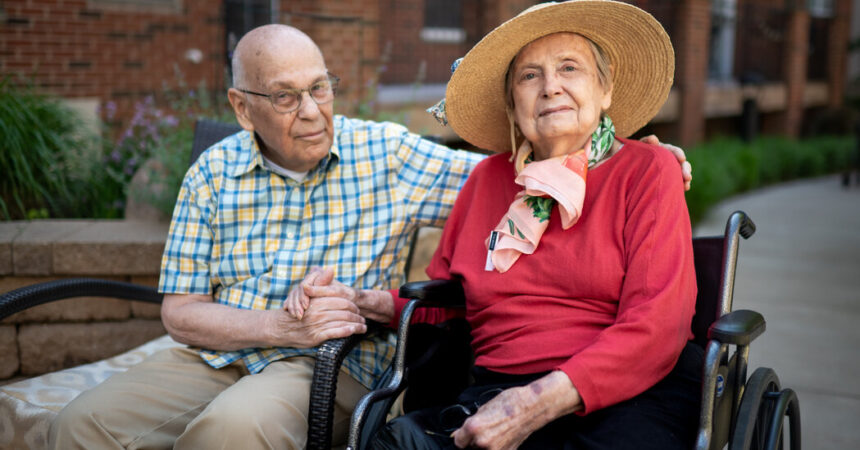Slowly however steadily, Marlene Nathanson was recovering. She had suffered a stroke in November 2022 at her residence in Minneapolis and spent per week in a hospital; afterward, when she arrived at Episcopal Properties in St. Paul for rehabilitation, she couldn’t stroll. Weak spot in her proper arm and hand left her unable to feed herself, and her speech remained considerably garbled.
However over three weeks of bodily, occupational and speech remedy, “she was making good progress,” her husband, Iric Nathanson, stated. “Her therapists had been very encouraging.” Ms. Nathanson, then 85, had begun to get round utilizing a walker. Her arm was rising stronger and her speech had practically returned to regular.
Then, on a Wednesday afternoon, one in all her therapists instructed the Nathansons that their Medicare Benefit plan had refused a request to cowl additional therapy. “She has to go away our facility by Friday,” the therapist stated, apologetically.
Mr. Nathanson, then 82, felt anxious and indignant. He didn’t see how he may organize for residence care aides and tools in 48 hours. In addition to, he stated, “it didn’t appear proper that the therapists and professionals couldn’t decide the course of her care” and needed to yield to an insurance coverage firm’s dictates. “However apparently it occurs quite a bit.”
It does. Conventional Medicare not often requires so-called prior authorization for companies. However just about all Medicare Benefit plans invoke it earlier than agreeing to cowl sure companies, significantly these carrying excessive worth tags, corresponding to chemotherapy, hospital stays, nursing residence care and residential well being.
“Most individuals come throughout this in some unspecified time in the future in the event that they keep in a Medicare Benefit plan,” stated Jeannie Fuglesten Biniek, affiliate director of this system on Medicare coverage at KFF, the nonprofit well being coverage analysis group. After years of steep progress, greater than half of Medicare beneficiaries at the moment are enrolled in Benefit plans, that are administered by personal insurance coverage firms.
In 2021, these plans acquired greater than 35 million prior authorization requests, in keeping with a KFF evaluation, and turned down about two million, or 6 %, in entire or partly.
“The rationale plans use is that they need to forestall pointless, ill-advised or wasteful care,” stated David Lipschutz, affiliate director of the nonprofit Middle for Medicare Advocacy, which regularly hears complaints about prior authorization from each sufferers and well being care suppliers. However, he added, it’s additionally “a cost-containment measure.” Insurers can get monetary savings by proscribing protection; they’ve additionally realized that few beneficiaries problem denials, regardless that they’re entitled to and normally win once they do.
Medicare Benefit plans are capitated, which means they obtain a set quantity of public {dollars} per affected person every month and might hold extra of these {dollars} if prior authorization reduces costly companies. “Plans are making monetary choices moderately than medical choices,” Mr. Lipschutz stated. (Medicare Benefit has by no means saved cash for the Medicare program.)
Such criticisms have circulated for years, bolstered by two experiences from the Workplace of Inspector Normal within the Division of Well being and Human Companies. In 2018, a report discovered “widespread and chronic” issues associated to denials of prior authorization and funds to suppliers. It famous that Benefit plans overturned 75 % of these denials when sufferers or suppliers appealed.
In 2022, a second inspector normal’s report revealed that 13 % of denied prior authorization requests met Medicare protection guidelines and possibly would have been accredited by conventional Medicare.
By that time, a KFF evaluation discovered, the proportion of prior authorization denials overturned on enchantment had reached 82 %, elevating the likelihood that many “mustn’t have been denied within the first place,” Dr. Biniek stated.
But few denials — solely about 11 % — are appealed. Final yr, a KFF examine discovered that 35 % of all Medicare beneficiaries didn’t know they’d a authorized proper to enchantment; 7 % mistakenly thought they’d no such proper.
Furthermore, the appeals course of might be advanced, a burden for these already struggling by means of well being crises. “Insurers might deny extra aggressively as a result of they know individuals don’t enchantment,” Dr. Biniek added.
Confronted with denials, sufferers might pay out of pocket for care that needs to be coated; if they will’t afford to, some simply quit. “Folks don’t get the care to which they’re entitled,” Mr. Lipschutz stated.
Responding to the inspector normal experiences, and to a rising tide of complaints, the federal Facilities for Medicare and Medicaid Companies has established two new guidelines to guard customers and streamline prior authorization.
Amongst different actions, it clarified that Medicare Benefit plans should cowl the identical “medically needed care” as conventional Medicare. “CMS will probably be conducting oversight” to make sure compliance, the company stated in an electronic mail to The Instances; its enforcement mechanisms embrace monetary penalties.
Beginning in 2026, one other new rule will pace the method, chopping the time through which insurers should reply to prior authorization requests to seven days from 14. (For “expedited requests,” it’s 72 hours.) The rule additionally would require insurance policy to put up prior authorization data — numbers of requests, evaluation occasions, denials and appeals — on their web sites. The next yr, plans should undertake a brand new digital system in order that plans and suppliers can extra effectively share details about prior authorization evaluation.
Sufferers and advocacy teams have highly effective allies of their efforts to reform prior authorization; well being care suppliers have additionally complained. The American Medical Affiliation, the American Hospital Affiliation and different skilled and commerce teams have referred to as for change; congressional representatives from each events have launched laws.
“Medicare Benefit makes us bounce by means of so many hoops,” stated Dr. Sandeep Singh, chief medical officer of the Good Shepherd Rehabilitation Community in Allentown, Pa. “It’s created such stress within the well being care system.” A number of years in the past, his group had one “insurance coverage verification specialist” whose job was to deal with prior authorization requests and appeals; now, it employs three.
Prior authorization has delayed admissions, Dr. Singh stated. It has steered sufferers away from specialised hospitals like Good Shepherd, with its intensive remedy schedules, to plain nursing houses or to residence care, he added, the place sufferers obtain fewer hours of remedy and face larger charges of re-hospitalization. It diverts time the workers would moderately spend on affected person care.
On a latest weekend, Dr. Singh spent two hours coordinating and submitting an enchantment for a affected person with spinal wire injury and mind trauma. After 19 days at Good Shepherd, “she’s come a great distance, however she will’t be residence alone safely,” he stated. But her insurer was “telling us to push her out now.” He determined as an alternative to increase her keep whereas the prior authorization appeals proceed. “Sadly, we must take up the prices” — about $1,800 a day, he stated.
Will Medicare’s new guidelines make a distinction? Thus far at Good Shepherd, “we proceed to see the identical degree of resistance” from Benefit plans, Dr. Singh stated.
Mr. Lipschutz, of the Middle for Medicare Advocacy, stated, “It’s clear the intention is there, however the jury’s nonetheless out on whether or not that is working.”
“It comes right down to enforcement,” he stated. He identified one lesson from researchers, nonetheless: It pays to enchantment.
Normally. Earlier in 2022, Mr. Nathanson acquired a analysis of prostate most cancers. His oncologist ordered a specialised M.R.I.; his Benefit plan stated no. However his physician contacted the insurer, and after some forwards and backwards it agreed to cowl the scan. Mr. Nathanson is in remission, though he’s nonetheless exasperated on the two- to three-week delay in his care.
The enchantment for additional rehabilitation at Episcopal Properties for Ms. Nathanson didn’t reverse their insurer’s denial, nonetheless. She stayed for 2 extra days, which price the couple $1,000 out of pocket; they felt lucky to have the ability to pay it.
After breaking a hip final fall, Ms. Nathanson now lives at Episcopal Properties. She, too, resents having her insurer overrule her well being care professionals. “I want I may have stayed with them longer,” she stated in an electronic mail. “However I needed to go residence earlier than I used to be prepared.”






